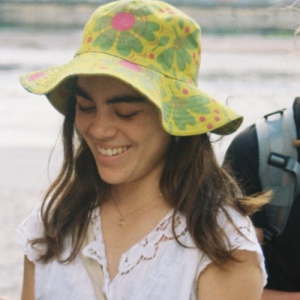


Growing up in Kapolei, Hawai'i, Ginger Link '24 was always interested in how communities function and develop. This curiosity led her to Dartmouth, where she pursued a Government major with a minor in Architectural History and Urbanism. "I wanted to understand how societies are structured, both in terms of their governance and their physical spaces," Ginger explains. During her junior summer, she participated in the Baltic LEAP program, which opened her eyes to the intricate relationships between energy, politics, and society in former Soviet countries including Lithuania, Latvia, and Estonia.
"I'm most interested in democracy building in former Soviet or Soviet-affiliated countries," Ginger says. "The Baltic LEAP program provided me the opportunity to take a comparative approach to my academic interests. These countries are each very unique, and we got to understand some of the intricacies that produce this uniqueness."
The Baltic LEAP program proved to be a turning point for Ginger. "The program really was amazing and opened my eyes to a part of the world I had never previously considered," she recalls. One highlight was being in Vilnius during the 2023 NATO summit. "In the US, we often prioritize American politics over all else, but an event like the NATO summit reminds us of the complicated dynamics at play in the international policy realm."
This experience also exposed Ginger to the complexities of energy transition in the region. "Our time spent in the Baltics was focused on the region's transition away from Russian energy sources," she explains. However, Ginger notes that there's room for improvement in exploring sustainable alternatives as more opportunities are available to work with renewable energy policy.
After graduation, Ginger's path reflects her diverse interests. "Next year, I will be working at an architectural heritage nonprofit in San Francisco that advocates for architectural preservation and maintains historic homes in the Bay Area," she says. "After this, I'll travel to Hungary to work with Central European University at their Democracy Institute."
This unique combination of experiences aligns perfectly with Ginger's academic interests and her desire to make a difference in the world. She sees a clear connection between her work in architectural preservation and her interest in democracy building, with energy policy as a crucial link between the two.
When asked about advice for incoming first-year students, Ginger emphasizes the importance of persistence and openness. "Pick one community that you know you want to be a part of at Dartmouth and work at it!" she advises. "Groups on campus may be accidentally exclusive — not because they want to exclude people but because their members are so close with each other. Take tightly-knit communities like these as a good sign. Just know, it takes a little bit of time for people to get to know someone new, but as long as you are open and your new communities are open as well, all will work out okay!"
Ginger's Dartmouth experience has been shaped by engaging courses and inspiring professors. She particularly enjoyed "Development Under Fire" with Professor Jason Lyall in the Government Department, and speaks highly of Professor Elizabeth Kassler-Taub in the Art History Department. "I am also a big fan of Govt 4, Introduction to World Politics!" she adds.
As Ginger prepares to embark on her post-graduation journey, she reflects on how her time at Dartmouth, particularly her experience with the Irving Institute and the Baltic LEAP program, has shaped her perspective on energy, democracy, and global affairs. Her story is a testament to the power of interdisciplinary studies and international experiences in shaping a student's academic and professional path.